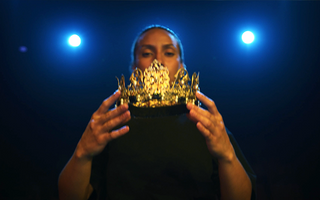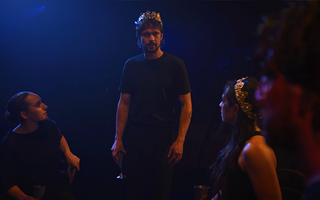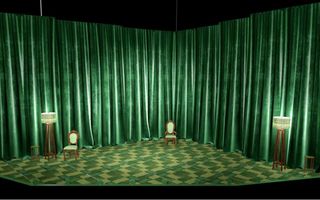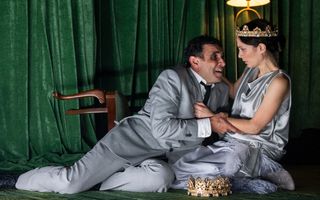 Watch
Watch
Macbeth is often referred to as a play full of driving ambition. Macbeth is considered deeply flawed. Is it his ambition that is his character flaw, or is it his weakness at the time of the murder of Duncan, or maybe his gullibility? Lady Macbeth first hears of the Weird Sisters’ prophecies in a letter from Macbeth. She then goes on to speak about his character in soliloquy.
1) Read the following extract from Act 1 Scene 5:
LADY MACBETH
‘They met me in the day of success: and I have learned by the perfectest report, they have more in them than mortal knowledge. When I burned in desire to question them further, they made themselves air, into which they vanished. Whiles I stood rapt in the wonder of it, came missives from the king, who all hailed me ‘Thane of Cawdor;’ by which title, before, these weird sisters saluted me, and referred me to the coming on of time, with ‘Hail, king that shalt be!’ This have I thought good to deliver thee, my dearest partner of greatness, that thou mightst not lose the dues of rejoicing, by being ignorant of what greatness is promised thee. Lay it to thy heart, and farewell.’
Glamis thou art, and Cawdor; and shalt be
What thou art promised: yet do I fear thy nature;
It is too full o’ the milk of human kindness
To catch the nearest way: thou wouldst be great;
Art not without ambition, but without
The illness should attend it: what thou wouldst highly,
That wouldst thou holily; wouldst not play false,
And yet wouldst wrongly win: thou’ldst have, great Glamis,
That which cries ‘Thus thou must do, if thou have it;
And that which rather thou dost fear to do
Than wishest should be undone.’ Hie thee hither,
That I may pour my spirits in thine ear;
And chastise with the valour of my tongue
All that impedes thee from the golden round,
Which fate and metaphysical aid doth seem
To have thee crown’d withal.
(Macbeth, Act 1, Scene 5)
Lady Macbeth is enticed by the possibility of Macbeth becoming King. She urges him to fulfil the Weird Sisters’ prediction. Her monologue later in Act 1 Scene 5 shows the audience the depth of her desire.
2) Read the extract below:
LADY MACBETH
The raven himself is hoarse
That croaks the fatal entrance of Duncan
Under my battlements. Come, you spirits
That tend on mortal thoughts, unsex me here,
And fill me from the crown to the toe top-full
Of direst cruelty! Make thick my blood;
Stop up the access and passage to remorse,
That no compunctious visitings of nature
Shake my fell purpose, nor keep peace between
The effect and it. Come to my woman’s breasts,
And take my milk for gall, you murdering ministers,
Wherever in your sightless substances
You wait on nature’s mischief. Come, thick night,
And pall thee in the dunnest smoke of hell,
That my keen knife see not the wound it makes,
Nor heaven peep through the blanket of the dark,
To cry ‘Hold, hold!’
(Macbeth, Act 1, Scene 5)
3) After you have read the two monologues, look up the meanings of any unfamiliar words. Make sure you understand all the phrases, then answer the following:
4) What does Lady Macbeth want?
5) Is her ambition for herself or for her husband? How do you know?
6) What is her opinion of her husband? What does she say about his personality?
7) What ideas does she carry from Macbeth’s letter into her following monologue?
8) List the requests she makes of the spirits. What is she asking them to do?
9) Why might she need this kind of supernatural aid?
10) What is she afraid of?
11) How would you describe the imagery she draws on? Use example from the text.
12) Extension – These two speeches are also very rewarding dramatic monologues to perform. The important thing is to clear away any assumptions or preconceived ideas you might have, and speak the lines from Lady Macbeth’s point of view. Remember, you are just a person who wants something very badly for someone you love. And yet, keep in mind how enormous an action this is you plan to undertake.










